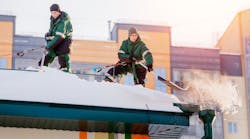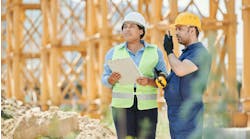Fall and winter are approaching, and the seasonal changes will affect the way hotels, commercial buildings, malls and multi-family structures are used by tenants and the public. Now is the time to start your walk-throughs and inspections and to perform preventive maintenance.
This action alone will spare yourself and tenants any possible damage from winter storms and their associated costs—including legal liability—if, for instance, your windows, HVAC, electrical or plumbing systems fail. Regular preventative maintenance adds to your building’s longevity and protects the ownership’s investment in the property and its value to tenants.
Obviously, 2020 is something of an unusual case because of the COVID-19 outbreak. Depending on local conditions and regulations, you may already be taking special measures for building cleanliness, but another important consideration is that business shutdowns may have left your building or mall with vacant spaces and less foot traffic.
It’s easy to overlook these under-utilized areas, but they still require attention. In this case ventilation should be shut down to save on expenses, and these spaces should be well-maintained and left in good condition while they wait for new tenants.
Standard Operating Procedures Are Top Down
To perform preventative maintenance and a thorough inspection, the best way is to start on the roof and work down. Just a simple visual inspection can save you from considerable hassle and expense later on. Here are some key things to look for:
1. To prevent any leaks from rain or snow, examine the roof and windows for any holes, cracks or leaks. Inspect the HVAC system, using your own or your manufacturer’s checklist. Clean and blow off any loose debris that might impact your equipment. Filters should also be replaced regularly—and now is the best time to do it.
2. Next, check the piping, including any that runs from HVAC equipment on the roof. Try to follow and trace piping even through internal corridors to each individual space whenever possible. Look for leaks or evidence of leakage, like water stains. Make sure that any exposed piping is well-insulated and properly wrapped to withstand winter weather and to avoid freezing and bursting.
3. Building alarm systems, including carbon monoxide monitoring systems and fire systems and alarms, should also be checked regularly. Check and replace the batteries in units located in every space. If you provide fire extinguishers, ensure they are in proper working order.
Inspect utility rooms to confirm these areas are clean and well-maintained. Look for rust, cracks, gaps and moisture accumulation.
[Read next: 5 Important Tasks for Reopening Buildings During COVID-19]
Check to see that any mechanical equipment stored there is in safe operating condition. In one instance that we experienced, a trash compactor handle broke and trash was allowed to pile up around it, creating a mess in the trash room and an unhealthy environment overall. In a large building with many tenants, trash can pile up quickly, generating the added expense of trash haulers and likely a heavy-duty clean-up effort.
Don’t Let a Small Problem Grow
Although many of the issues listed here appear to be minor irregularities, anything you find should be repaired as soon as possible to prevent further damage to the property and to your tenants (and their property) in the months to come. Over time, and especially with cold and inclement weather, a small problem can quickly escalate into a very big one that will require not just repair, but replacement or complete renovation.
Again, remember also to inspect areas that have been vacated and are temporarily not in use. Regularly give these areas at least a visual check, and when you leave them, be sure to close the vents and turn out the lights.
When these spaces aren’t being actively used, the facility manager or maintenance staff will be most likely to recognize and report a problem, so be sure to check in with them frequently. This will help avoid any unhappy surprises and keep these areas ready for prospective new tenants.
Finally, another unfortunate result of the COVID-19 closures is that you may be shorthanded during this time, as some of your employees might have been furloughed or terminated.
Protecting your property is an issue important enough to call in experienced and knowledgeable help from a third-party managed services provider, if necessary. This does mean incurring some upfront cost, but it will save you money long-term as you work to ensure decades of useful life for your building.
About the Author:
Ben Leake is the director of operations, Eastern Territory for RWS Facility Services.
More to read:


